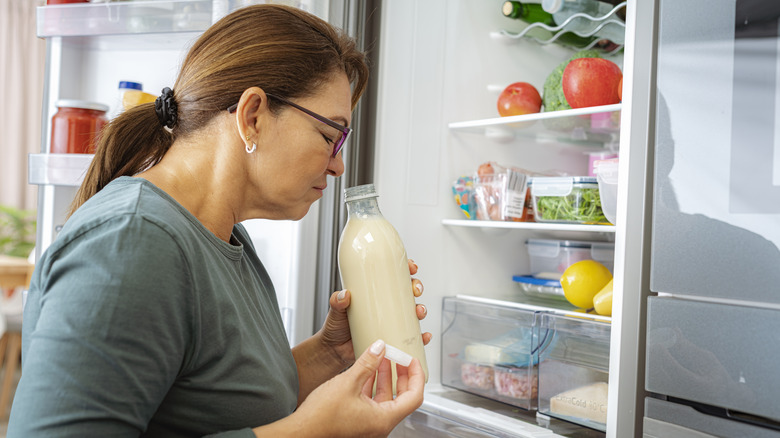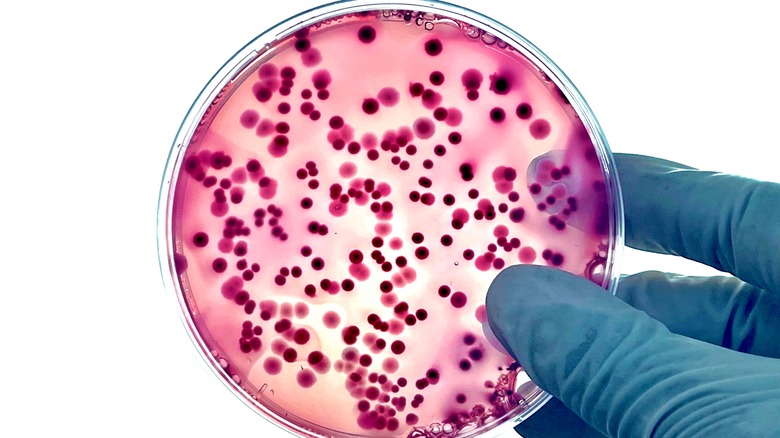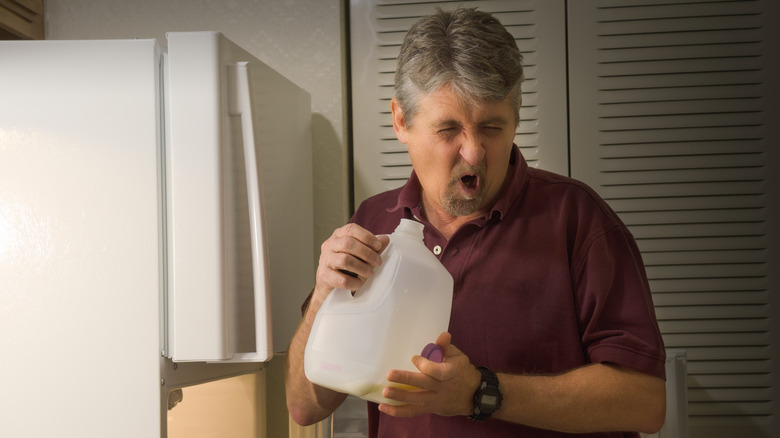Why Relying On The Smell Test Is A Huge Mistake For Food Safety
If you're unsure whether that meat or milk is still good to eat, there's a good chance you're going to sniff them — and possibly make a decision based entirely on that smell test. But according to the Centers for Disease Control and Prevention (CDC), that's a mistake: The CDC says that the pathogens that cause food poisoning cannot necessarily be detected by smell.
Other food safety experts have backed this up, pointing to listeria and salmonella as the main issues. These microbes are two of the biggest culprits when it comes to food poisoning, and they cannot be detected by smell for a couple of reasons: First, while they can produce scents, they are likely only present in a tiny amount that would be imperceptible to the human nose (and that tiny amount can still poison you). Second, the smell of the food itself will likely drown out any possibility of detecting them with the sniff test. This issue applies to the taste test, as well: Listeria doesn't have any taste to it, and the same goes for salmonella, so there's no use in trying to taste a little food to check how fresh it is. In fact, this is a worse idea than the sniff test, since you actively risk poisoning yourself.
Protecting yourself from listeria and salmonella
Listeria can be present in a wide range of foods, including raw meat and fish, smoked fish, deli meats, and raw or processed fruits and vegetables, as well as unpasteurized dairy products. Salmonella appears in some of the same places like meats, fruits, and vegetables, but can also appear in some more unexpected places like flour or processed foods like peanut butter.
Unfortunately, there's not really a simple way to detect either of them. To properly check for listeria, you'd need to effectively swab-test your food, and while there are kits that can do it rapidly, many people might consider it obsessive to regularly swab your sausages and veggies for a lab-style test. Testing for salmonella is similarly clunky, where even "rapid" tests can take hours to process.
Since testing isn't reasonable for most people, it's all about taking the right precautions: Keep your refrigerator and workspaces clean, make sure food is stored at the right refrigerator temperatures, and wash fruits and vegetables. The CDC also firmly advises following its guidelines on how long you can store foods — and once you've had it in the refrigerator too long, throw it out (rather than risking a sniff test). Pay attention to expiration dates, too — although be aware that markers like "sell by" dates are more about food quality than safety, so it may be better to follow go-to rules like "throw ricotta out a week after opening" (for example).
But the smell test still has its place
The smell test may not be any use for detecting dangerous pathogens like listeria and salmonella, but it's not completely redundant. Smelling food is a useful way to figure out whether or not it's spoiled. Milk is a textbook case of this, as it'll start to smell less fresh as it sours — but if your nose picks this up, it doesn't mean that milk will poison you; rather, it's more likely to just not be particularly pleasant to drink. A lot of the yeasts and molds that indicate spoilage aren't going to harm you the way that listeria or salmonella will, although it may not be pleasant to eat them and you may even end up nauseous as a result. The sniff test is more about assessing food quality rather than safety, although it may be a little more useful with some foods — if you get a putrid, rotting smell from meat or eggs, go ahead and ditch them, since they're probably beyond any point where they're realistically edible, even if there's no listeria or salmonella.
Similarly, while a sight test is no use for detecting salmonella or listeria, it's still useful for food quality and perhaps safety to a limited degree, if you're using your eyes to look out for mold on bread, dairy, and other foods.


